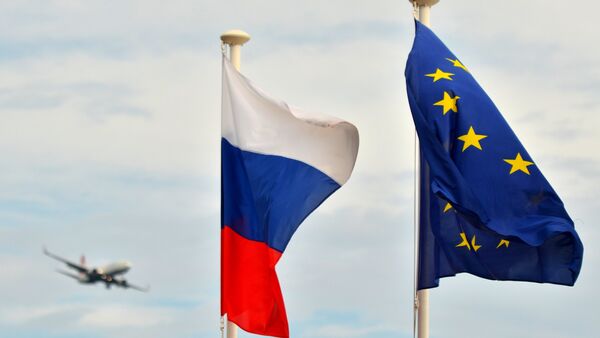MOSCOW, November 5 (RIA Novosti), Daria Chernyshova — The United States has been trying to gain control of the European Union for decades and its recent use of sanctions against Russia is yet another step it is taking to direct EU economic policy, Willy Wimmer, former German member of parliament and OSCE Parliamentary Assembly vice president told RIA Novosti on Wednesday.
“By the sanctions imposed against Russian Federation, the United States is getting control over a major part of economic policy of the European Union. Sometimes we think this was the main target – to use Ukraine in the development to get in control of the economic policy of the European Union,” Wimmer said, adding that “sanctions lead to conflicts, and sometimes to war.”
“We have to be very realistic that we have to fight with the United States, we have to get rid of this kind of a policy because this destroyed the common house of Europe,” Wimmer urged.
Back in March, the European Union followed the US’ lead in imposing sanctions against Russia over its alleged involvement in the Ukrainian crisis. Over the past few months, it has imposed several rounds of sanctions on Russia and has threatened even more. The sanctions mostly target Russia’s largest banks, energy and defense companies, as well as some individuals. In August, Moscow responded with a one-year ban on food products from countries that imposed sanctions on Russia.
“A new round of sanctions would lead us to conflict. I can only hope that German politics is really constructive and not pursuing the way of sanctions because people will suffer,” Wimmer pointed out when asked about possible European sanctions against Russia following Moscow’s recognition of elections in Donbas.
He also stressed that the United States and NATO have a particularly biased approach toward Russia – one that Europe should get rid of.
“Now we are living in a situation where the US is pursuing the policy vis-à-vis the Russian Federation that either we explode you and we want unconditional surrender or we throw you out of Europe. That is not our policy and cannot be our policy because this will lead to conflict,” Wimmer told RIA Novosti.
“Many people in the western part of Europe are rally fed up with NATO lies, because we see that everything is complicated,” he said, adding that NATO declarations contradict official remarks made by the OSCE in Europe.
“When it comes to the developments in Ukraine, we hope that Berlin is realistic and knows about the national interest of Germany,” Wimmer said adding that Germany should “play a constructive role which brings us back to a constructive policy toward the Russian Federation.”
Speaking about the events on the ground in Ukraine, the former OSCE official noted that Kiev should bear the primary responsibility for the conflict, as it was the one that created it.
“You cannot treat major part of your own country as an enemy, as a hostile power – what the government in Kiev did from the very beginning,” Wimmer said. “American mercenaries have been engaged in the eastern part and they did they did their utmost to organize the conflict there. Since then there were critical developments in eastern part of Ukraine and I think the government in Kiev is at number one place when it comes to critical development s in Ukraine, they are responsible regardless what people in the east are doing themselves.”




